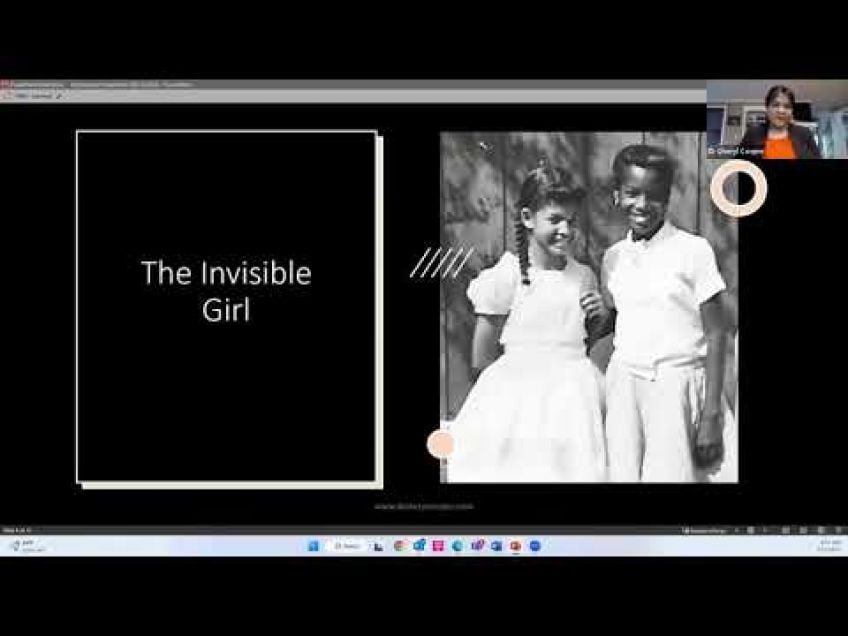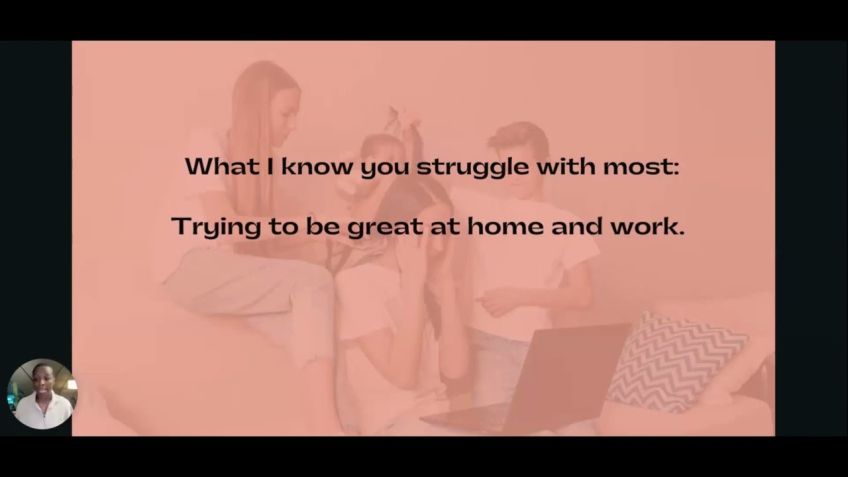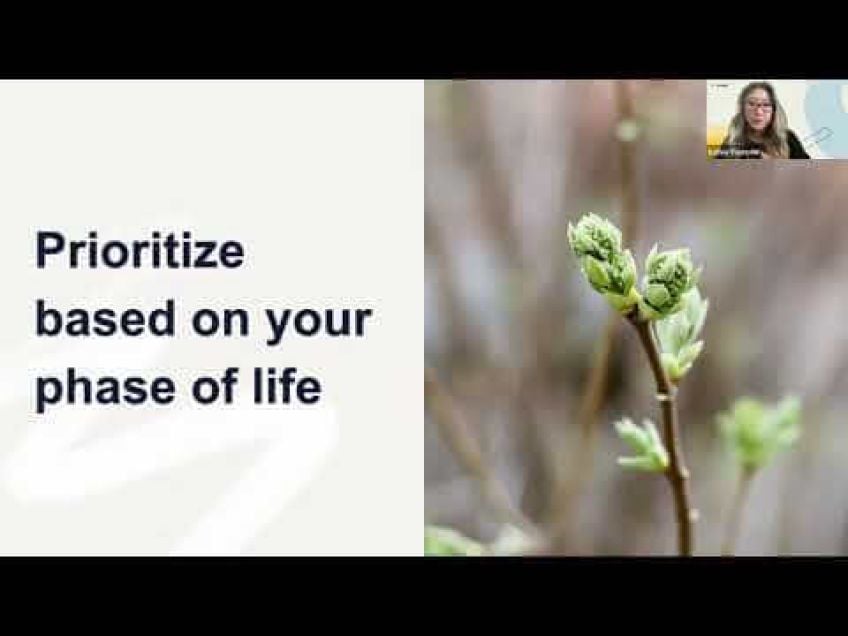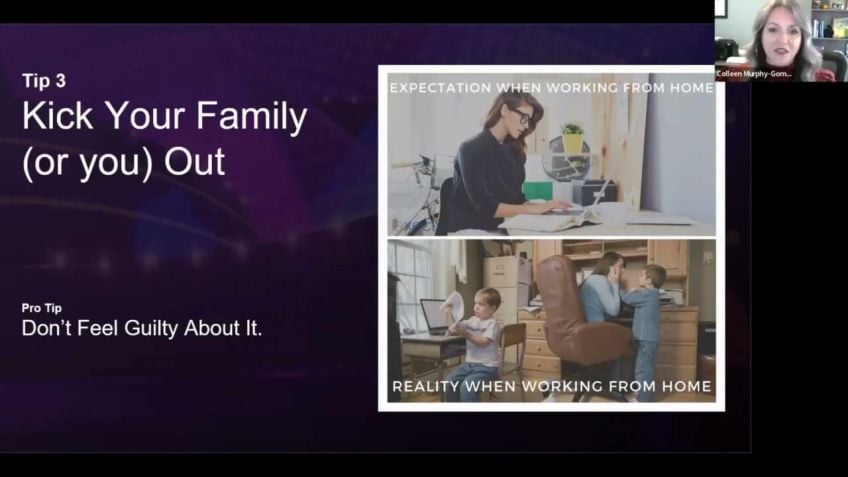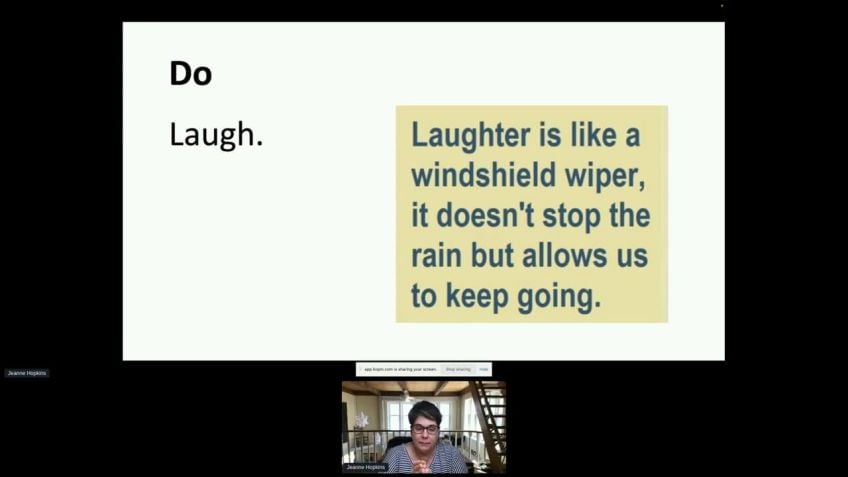Stephanie LeBlanc-Godfrey Parenting Backwards
Step Up Your Parenting in the Tech World
As a working parent, juggling a career in the fast-paced tech industry along with raising children can be quite the balancing act. The key to mastering this balance lies not in perfect symmetry, but in integrating elements of your professional growth into your parenting journey. In this blog, we're exploring insights from a talk by Stephane Leblanc Godfrey, the global head of inclusion programs for women of color at Google and the founder of Parenting Backwards.
Ordinary Moments: Extraordinary Lessons
>All it takes is one ordinary moment to teach your child an extraordinary lesson. You, their caregiver, have the power to impact change in their lives. There's no need for grand interventions or well-worded speeches. Everyday interactions can be used to teach valuable lessons.
>Remember, it's not about fixing the behaviour for the moment, but instead providing long term, sustainable, and deeply transformational results in your parenting life.
The Concept of Parenting Backwards
So, what exactly is parenting backwards? It's a self-work philosophy that places you—the parent—at the center of your children's world. It emphasizes that how you model yourself influences the kind of person your child is becoming.
>Whether it's through frustration or patience, sarcasm or kindness, you are setting trends in your child's life on a consistent basis. It is important to examine both your direct and indirect influences and to take actionable steps to model the behaviour you want your children to emulate.
Taking Your Children on Your Learning Journey
As a parent, it is beneficial to include your children in your personal and professional development process in age-appropriate ways. By letting them witness and participate in simple but important tasks such as financial planning or chores, you can impart useful skills and values.
>It's all about embodying the spirit of the phrase, "Kids watch who you are to understand who to become." They are observing, soaking up, and internalizing how you respond to various situations.
Tackling Systemic Racism and Social Injustice
Parenting backwards can also be used to address underlying systemic racism and social injustice. The key here is to be an integral part of your child's conversation about these issues. As parents, it is our responsibility to inspire conversations and actions towards diversifying our children's perspectives.
>Discuss different ethnicities, cultures, and ideologies. Make conscious efforts to incorporate diversity in facets of life, such as the books you read or the toys they play with. Let's teach them not just to tolerate, but to be genuinely respectful and inclusive of people from all walks of life.
Be the Change Your Child Needs
We need to do the self-work to model the behaviours we want our children to exhibit. At times, this may involve facing harsh truths about ourselves, exploring complex feelings, or even healing old wounds. It may take time and work, but the outcome is invaluable—a heightened journey of parenting and an empathetic, responsible, well-rounded child.
Transform your everyday interactions into extraordinary learning experiences and cultivate a nurturing and intentional environment for your child by parenting backwards—as the saying goes, the only constant is change. Don't be afraid to change for the betterment of your child.
Continuing the Conversation
Want to discuss how to enhance your parenting style? Reach out to Stephanie Leblanc Godfrey at [email address], or connect with her on Instagram @stephanieleblancgottfried, or visit www.ParentingBackwards.com. Let's bring about a revolution in redefining the dynamics of parenting.
Remember, your children are your mirror, reflecting not just your face, but your character, mannerisms, and values. By improving yourself, you are creating a better world for them. So, start today, and see your child emulate a better version of you.
And remember, failure is not the end—it is the beginning of a new learning curve. Celebrate both your wins and failures and share these experiences with other parents, because after all, it takes a village to raise a child.
Video Transcription
As this working mom. I'm super curious about our next talk. It's called parenting backwards a session for parents in the fast paced tech world who are always investing in themselves and their careers and want to bring that level of intentionality to their parents.And it's my pleasure to announce, Stephanie Leblanc, Gottfried, the global head of inclusion programs for women of color and Google and the founder of parenting backwards. Hi, Stephanie and welcome.
Hi, Anna. How are you?
Good. You
good. I am just trying to figure out how to share my screen and then I'm ready for us to get started, but happy to be here. And so thank you. You can see your screen.
Super excited for your talk. Enjoy it. I will leave the stage for
you. Thank you. Good morning. Good afternoon. Uh My name is Stephanie Leblanc Godfrey. Um First things first, I'm gonna lead today's session with an assumption that everyone that's joining today is either a caregiver to an amazing little human being in your life, par a grandparent aunt, uncle or family friend, you have skin in the game and can have a tremendous impact on the child or Children in your life in our time together.
I'm gonna show you your powers when it comes to parenting and how you can take advantage of ordinary moment to moment engagements as opportunities to teach everyday interactions have the potential to teach invaluable lessons. So please throw away the idea that you need these grand interventions well, worded speeches or worse yet, some parenting strategies and blanket techniques out of a parenting book, they may fix the behavior for the moment, but I'm here to provide long term sustainable and deeply transformational results as it relates to your parenting life.
And so a little bit about me, I'm a working parent and a parent that works, which means at any given hour of the day, I'm thinking about feeling guilty over or running to or from one or the other. I work at Google in the diversity and inclusion space, which is both hard work, but also hard work. And these are my three kids, 10, 8 and four, Emery Olivia and Noah. And they were the inspiration behind parenting backwards. And they have also given me lots of opportunities to test and iterate. So what is parenting backwards? Well, it's a self work philosophy. You are at the center of who your Children are today with no judgment attached, right? You is both directly you but also indirect, your partner or spouse, your grandparents, the nanny, the teacher, whoever is in the child's life on a consistent basis. And here's how you show up. So think of if you just look at the interactions with uh your child's siblings, between their siblings or their peers, right? So in our household, both frustration, sarcasm and shortness is prevalent. So in my head, I'm the close to 40 something over tired person in the house.
And so I think I deserve to be a little jaded and short on patients sometimes. Well, they think that that's just normal behavior. And so they're exhibiting it at 10 and eight. Not good. Another thing to look at their tone when they play, make pretend. So I remember when one of my daughters was really uh young, she'd be yelling at her dolls when she played teacher, you're not doing it right? Go sit down, go in the corner. And so I asked her, you know, where is she hearing this? Cause that's not the way in which I spoke with to her. Needless to say that on earth uh dynamic within the classroom at her school where the teacher was constantly uh yelling at her. So another story for another day, but it brings out who the people in your life and how they're impacting the actually show up on a day to day basis. And how do they react when they're frustrated or sad? Have you taught them words to des describe their emotions? How do you showcase your own sadness or anger? And how do you talk about your deescalating methods? If we don't give kids the vocabulary to talk through their feelings, then no wonder that when they become frustrated, uh you know, they can exhibit it in, in ways that that aren't very pleasant to us as parents.
And so you have the power to impact change in your level of connection from transactional and hierarchical to really deep and meaningful. The question is how right? So focus on your own development. I'm sorry, there is no magical chant, no secret spell that you can just say and everything will fall into place. This is work, but it's valuable work and it's worthy work and it benefits both you and your Children. So in terms of taking them on your learning journey and making it fun, I'm sure that everyone tuning in today are all a type overachievers. We read all the books, we watch all the TED talks. We take all the classes to develop ourselves both personally and professionally. But what if we imparted that onto our kids in age appropriate ways? So for an example, uh over Christmas over the Christmas break, I was cleaning up my uh cleaning up our household finances. And I thought what would be a really neat way to include them uh in that part. And so what I decided to do is two things. One, we actually went to a mall to shop which I never ever do and two, we took out cash to do it. So as a family, we sat down, wrote out everyone that we wanted to get gifts for assigned a budget to them cash in an envelope and we hit them all.
And so they were able to spend the day really choosing the things that they wanted to get for their loved ones and realizing, wow, that money in that envelope goes really, really quickly. Um And all we're left with is coins at the end. Um So it's a really tangible way for them to, to really interact with money. And then they had a lot of decision making throughout the day. So there were places where they underspent and they could apply more to other members of the family or in the case of their dad, they overspend which is fine. He's dad, right? But that meant that we would have to take the budget out of others. So we had to have that conversation. Are we ok with that? Maybe do we wanna look through what we've just uh bought for him and something else? Um And so that day was so monumental and such a teaching experience for me working on our finances and trying to stick to a budget for ones for Christmas and then them just learning how money works, the price of things, the fact that it goes away and we're left with an en empty envelope of the day.
And so we b both worked on our, our financing uh journey together. And so I really, really love uh this quote and it really embodies the spirit of parenting backwards. And that's that kids watch who you are to understand who to become. They are soaking up and internalizing all that we say and do and how we show up in the world. You know, we actually hold beliefs and values and assumptions that we've never examined from past life from as we're growing up and into adulthood. Um But what that leads us to is harshly imposing expectations and exhibiting behaviors that we aren't even sure that we want or need. So the point here is what's the self work, the education, the mindset shift the direct conversations, even the healing of traumatic experiences that each of us need to do to be able to model what we want our kids to emulate because they are holding up a mirror to us and guarantee that any behavior that you see good or bad can be attributed back to you or someone within your uh internal circle in which they're picking it up from.
And so I'd be remiss if I didn't spend a moment just to talk about how you can use the parenting backwards philosophy to address where we are today with systemic racism and social injustice. So this is Martin Luther King Junior and I have him to thank for how I started uh talking to my kids about race. Uh And it's not in this grand way. It was very direct So when my child was around four years old, she came home super excited and she was like, I love Martin Luther King. He's amazing. And I was like, OK, yes, he is. And then she follows up with, he made it possible so that my, that I can play with my cousin. And I was like, well, well, what do you mean? And she's like, well, I'm white and my cousin is black. And so therefore Martin Luther King made it possible. So white and black Children can play together. What I learned from that is whether we choose to participate or not, kids are formulating opinions about the world around them and internalizing it. So I was so worried about bringing up race at such a young age. Like I didn't wanna plant the seed about it. Um I didn't want to talk about it too soon but guess what? She had already made a determination of who she was versus who other people were.
Um And so the point there is that we can either be part of the conversation or actually there should be no alternative. We must be a part of the conversation. And so here are some areas that we can just take a look at to diversify. Um our current life, right? To just do some self reflection. I mean, yes, we should give, yes, we should educate ourselves. Yes, we have to face things that we've never had to before. Um or for many of us that we've had to engage with throughout our lives. Um But we also have to do some self reflection in these areas and talk through areas that we can intentionally work on. So your inner circle and friendships, right? Who do you hang around? Who's sitting at your dinner table? Who do you go out with on a Friday night? Who do your kids see you around? What are the leaders that you learn from? What books are you reading that they're seeing laying around the house? What TV? Shows are you watching where they can see a diverse crowd? Your place of worship, how diverse is it? Is it if that's a part of your life, your beauty standards, who do you idolize? Who do you mention? Wow, she looks great. Oh, I love that dress. What do those women or men look like? What are the toys that you buy for your kids or the books that you read to them being intentional about showing that diversity? But also speaking very specifically and intentionally about that diversity. We must be a part of that conversation with our kids.
Um And it's something that, you know, as diversity and inclusion is something that's super critical at work and something that's talked about at work all the time, it has to translate over um into the work that we, that we do at, at home as well. And so I wanna keep this conversation going with parenting backwards. Uh I offer a number of ways to en engage with parents. So, one on one coaching group coaching, if you have a mom's group or you wanna do it as a family unit, um, a six week course where you can go deep uh with an accountability group or even corporate sessions where I can talk with uh, with your parent working groups or, er, GS that support, um, or, er, GS that support uh parents within, within the workplace.
I think the value I know the value that I bring here is experience, right? We all have something to share with each other around the things that we want to work on, around the places that we want to be. And I think there needs to be an intentional way in which we talk about parenting and we talk about and share both our wins and our failures. Um and kind of cross share what worked, what didn't and really create that psychologically safe space um to be candid about how our parenting is going. We have all of these amazing conversations that are happening today and beyond in conferences. But as a parent that is definitely an intricate balance in how we show up within the world and within our job, if we had a crummy bedtime routine that can affect our morning and then how we show up um at work. And so finally, I just wanted to also share um some contact information So I have my email address, my Instagram and also my website um so that we can keep the conversation going, talk to each other about what's working and really dive in into you, right? You is who is uh has the most power in having an impact on your child. Going back to what I shared about the role modeling piece. They are watching what we do.
They're literally holding up a mirror uh and looking at how we're uh reacting to things or not reacting how we're speaking about things or being silent. Uh And they're taking that as part of, of that core. So we have a, we have a responsibility to do the self work uh so that they can witness it and be part of it to become just the amazing empathetic uh human beings that, that we all have for them. And now I know we have time left, I intentionally left some time so that uh we'd be able to have a dialogue and have questions. So would love um to look in the chat and see if, if anyone has anything.
Thanks a lot, Stephanie. It was a very interesting presentation. Can you hear me?
Yes, I can.
OK. Perfect. Um I really loved what you said that we must be a part of a conversation and that our Children actually know much more than we think they do and we can learn from them. Right? Me myself as a working mom. My daughter is still very young. She's a baby still. But uh you know, I want to make right choices. And I want to start introducing her early enough and explain some concepts that we shape her mindset and would help her grow as in a, in a person that would see the world the way I do as diverse as bright and learn more about different, many differences that we have that make the world's passion.
And I'd like to ask our audience, do they have questions to Stephanie? So we can ask her right now, people are thinking as they say that it's a wonderful talk, amazing presentation and ask, please feel free to ask your questions. Amazing one. They say
awesome. What I'd offer up for you as you mentioned that you have a two year old, right? I shared
my 408 months.
OK.
There is a question. Can I go ahead and ask you, what do you think coworkers without Children can do to show support, especially with increase in remote work? Thank you a question from to Nusa.
Yeah, that's a great question. I mean, it's tough, right? We get on calls and we're constantly interrupted either by a kid or a pet or a parent. Yeah. And so um I think those um those of us who do not have kids is just to really be, be empathetic, right? And I think those who do have kids is to also ensure that although they may be the center of your world and they are not the center of everyone else's world. Um And so finding that balance between sharing stories, pictures or whatever and not, and holding holding back from that and just getting to work or just talking about other aspects um of your life. Um So that you're not inundating uh people who don't have kids with topics that they may not be interested in. Um And then also providing space for those who don't have kids an opportunity to share who they are and not feel any particular way about uh about them. Not
right. Uh Before I had, you know, I had my daughter, I was like, I didn't really understand how I like really understand how, what parents feel and what are the challenges. But now I do, but by asking the right questions and spending time, you know, with, with people who have kids, Children and right now it's impossible, of course, but have an empathy. What you mentioned, it's, it's really important and crucial right now. Thank you very much, Stephanie.
Thanks a lot for this super interesting presentation. I took some notes for myself personally. I believe it was super helpful for our audience. Thank you very much. Enjoy the rest of your day and see you. Thank you very
much. Bye bye bye.

